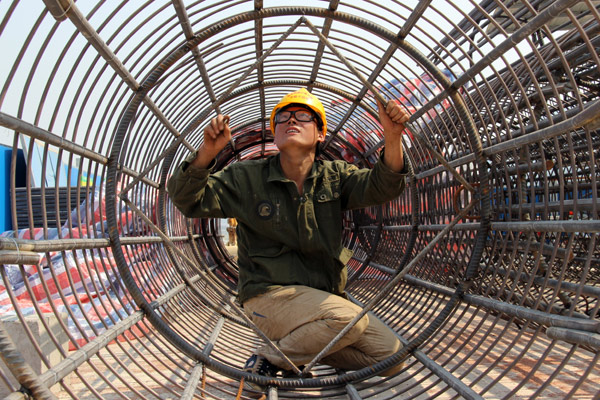Crash of economic crash theory
- By Dan Steinbock
 0 Comment(s)
0 Comment(s) Print
Print E-mail China Daily, June 2, 2015
E-mail China Daily, June 2, 2015
|
|
|
A worker checks a bridge reinforcement at a construction site of the Yiyang-Loudi Highway in Central China's Hunan province. China's GDP growth slowed to 7.4 percent in 2014, the lowest reading since 1990. [Li Aiming / China Daily] |
For a quarter of a century, China's economic crash theory has been a lucrative cottage industry in the West. But there is a reason why certain times favor the doomsayers.
At the turn of the millennium, the economic crash theory was exemplified by Gordon Chang's The Coming Collapse of China (2001). In reality, that's when China became a member of the World Trade Organization and growth soared to double digits until the West's financial crisis in 2008-09. So any investor who took the theory seriously lost big time.
After the crisis, new concerns surfaced. Since China relied on export-led growth and world trade plunged, the crash prophets predicted the collapse of its economy. The truth is, as demand in the West plunged, so did China's import growth. China adjusted to a new, but far more challenging environment.
Then came the concerns over the overheated property market. In a January 2010 interview with The New York Times, hedge fund short-seller James Chanos predicted the Chinese economy would crash, resembling "Dubai 1,000 times - or worse". But still China did not crash. Instead, the "hard-landing" prophecies were offset by realities of "slow landing", as I argued at the time.
Today, as the world economy is anxiously preparing for US interest rate hikes, the crash oracles are in fashion again, as evidenced by scholar David Shambaugh's article, "The Coming Chinese Crackup", in The Wall Street Journal in March. It was followed by The Washington Post columnist Robert Samuelson's "China's coming crash?" recently.
Some of these recurrent predictions are more cautiously worded, others are misinformed or flawed, and some are simply biased. But they all share a common denominator. They peak amid challenging economic times in the West, not always in China. For some crash theorists, China is a convenient scapegoat for economic challenges in the West.
Certainly, China has challenges of its own. But how serious are they?
Last year, China's growth rate was 7.4 percent, the slowest since the global financial crisis. In spring, the economic data signaled slowing manufacturing, disinflation and depreciation pressures fueled by capital outflows. So the People's Bank of China has cut the required reserve ratios and interest rates, while the government has revived targeted mini-stimulus policies.







Go to Forum >>0 Comment(s)